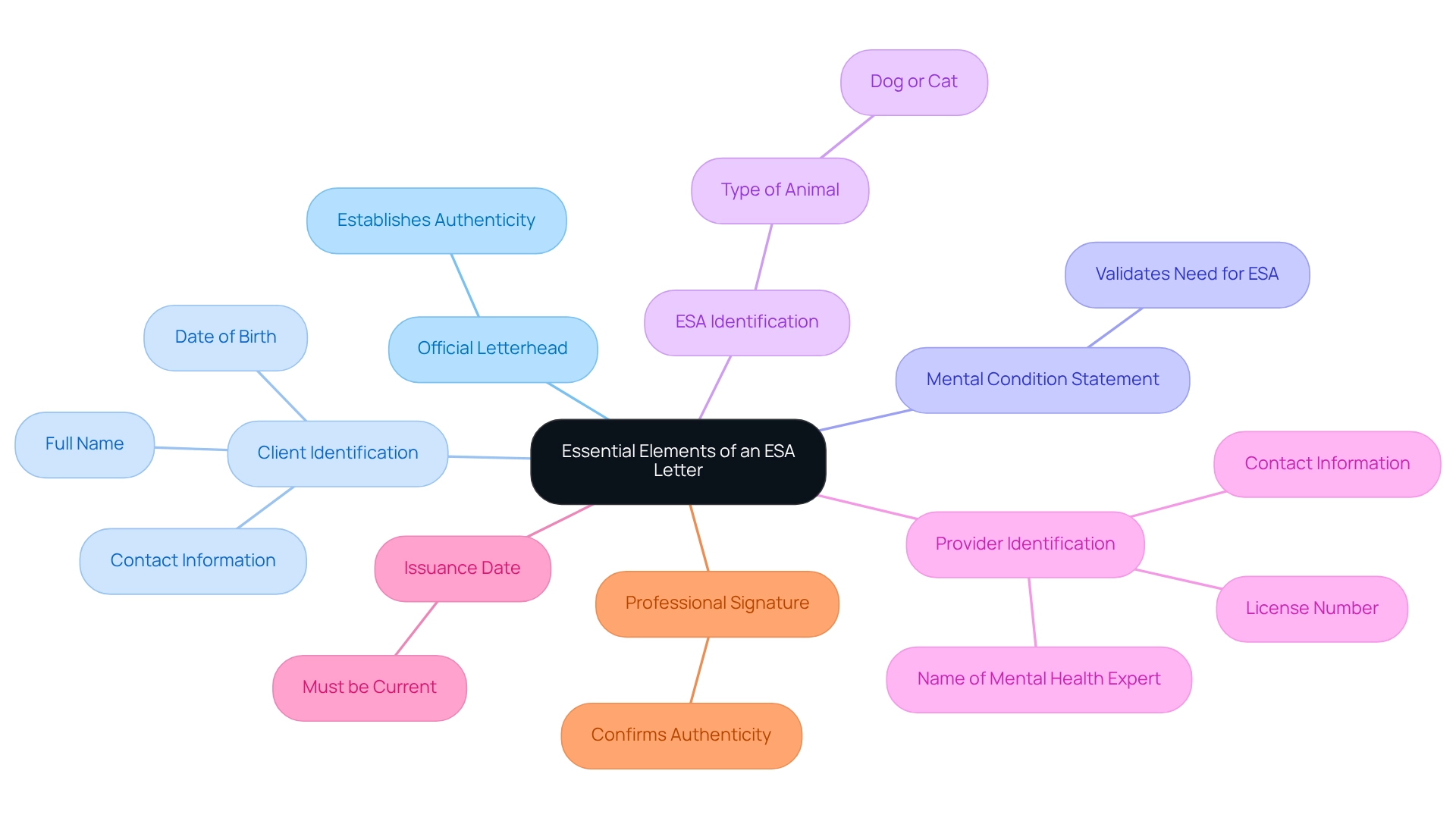

Essential ESA Letter Sample for Mental Health Professionals
by Lena Park
Last updated: July 5, 2025
Verified and Approved by:
Angela Morris,
MSW, LCSW
Fact Checked

Overview
This article highlights the essential components and significance of an Emotional Support Animal (ESA) letter for mental health professionals, recognizing the emotional challenges that many individuals face. It is important to understand that a legitimate ESA letter must encompass specific elements:
- The mental health provider’s information
- The individual’s details
- A clear statement of need
These components are not just formalities; they are crucial for compliance with legal standards and for ensuring that individuals can access the emotional support their ESAs provide.
Navigating mental health struggles can often feel overwhelming, and the support of an ESA can make a meaningful difference. The letter serves as a compassionate solution, affirming the bond between the individual and their animal. It validates the necessity of this support, allowing individuals to embrace the comfort and companionship that their ESAs offer.
By understanding the importance of an ESA letter, we can foster a sense of hope and reassurance. Remember, you are not alone in this journey, and the support available through ESAs is a testament to the love and care that exists in our lives.
Introduction
In a world where emotional well-being is increasingly recognized as essential to overall health, many individuals face significant struggles with mental health challenges. For those grappling with anxiety, depression, or PTSD, the journey can often feel isolating and overwhelming. However, Emotional Support Animals (ESAs) have emerged as vital companions, providing not just companionship but a lifeline of comfort and stability. These unique animals play a crucial role in helping individuals manage their conditions, offering a sense of peace and reassurance during difficult times.
As the demand for ESAs continues to grow, it becomes increasingly important to understand their role in mental health support. This includes navigating the legal intricacies of ESA letters and recognizing the ethical responsibilities of mental health professionals. By addressing these aspects, we can ensure that individuals receive the support they need in a compassionate and informed manner.
This article delves into the significance of ESAs, outlining the essential elements of legitimate ESA letters and discussing the legal and ethical considerations that govern their issuance. It serves as a comprehensive guide for both clients and practitioners, navigating this increasingly important area of mental health support. Remember, you are not alone in your journey, and there is support available to help you thrive.
Define Emotional Support Animals and Their Purpose
Emotional Support Animals (ESAs) serve as cherished companions, offering vital comfort and support to those navigating emotional or psychological challenges. Unlike service animals, which are trained to assist individuals with disabilities, ESAs primarily provide companionship and emotional stability. Their presence can significantly alleviate symptoms associated with mental well-being issues such as anxiety, depression, and PTSD, delivering unconditional love and support that many individuals desperately need.
As more people recognize the importance of ESAs in mental health care, the number of individuals seeking their companionship continues to rise. This growing trend highlights the necessity for understanding the role of ESAs, especially among mental health practitioners who must navigate the complexities of recommending an ESA letter sample for those seeking these benefits in housing and travel situations. Wellness Wag offers a compassionate and straightforward approach to obtaining authentic ESA documentation, ensuring that individuals can access these essential services affordably. The process begins with a few simple questions about their ESA needs, followed by a consultation with licensed medical professionals who provide expert guidance. Once approved, individuals receive their ESA document within 24 hours. With prices starting as low as $32.25 and interest-free payment plans available, securing an ESA letter sample has never been more accessible. Additionally, Wellness Wag’s money-back guarantee underscores their commitment to client satisfaction, providing peace of mind.
Real-life examples illustrate the profound positive effects of ESAs on mental well-being. For instance, therapy dog programs in educational settings have flourished, showcasing a significant decrease in stress and anxiety among students, which in turn enhances their emotional well-being and academic performance. Such evidence reinforces the critical need for an ESA letter sample in therapeutic environments, making it essential for mental wellness professionals to recognize their significance and the necessary legal documentation to help individuals access these benefits. Furthermore, Wellness Wag prioritizes client confidentiality in accordance with HIPAA guidelines, ensuring that all medical information is handled with the utmost care. Client testimonials further illuminate the seamless approval process and the uplifting experiences of those who have benefited from Wellness Wag’s services.
Outline Essential Elements of an ESA Letter
An effective esa letter sample must include several critical elements to ensure its legitimacy and compliance with current legal standards.
First and foremost, the esa letter sample should be printed on the official letterhead of the licensed mental care provider, establishing authenticity. This small detail can provide significant reassurance to those in need of support. It must also include the full name, date of birth, and contact information of the individual, ensuring proper identification and fostering a sense of connection.
A clear statement indicating that the client has a mental condition requiring the support of an esa letter sample is essential for validating the need. This acknowledgment is not just a formality; it recognizes the emotional struggles that many face daily. Furthermore, identification of the ESA is necessary, specifying the type of animal—such as a dog or cat—without detailing the breed or age, to maintain privacy and focus on the support role that these animals play.
The esa letter sample should also include the name, license number, and contact information of the mental health expert, confirming their authority and qualifications. This transparency can provide comfort to those seeking assistance. Additionally, the issuance date must be current, as ESA documents typically require annual renewal to remain valid. Finally, the professional’s signature is crucial for validating the esa letter sample and confirming the document’s authenticity.
In 2025, these elements are not only vital for compliance but also serve to facilitate access to essential accommodations under laws such as the Fair Housing Act and the Air Carrier Access Act. For instance, in Longmont, local businesses are increasingly recognizing the importance of ESAs, adapting their spaces to be more inclusive for ESA owners. This trend underscores the growing societal acceptance and need for such support systems. As Jonalyn Dionio noted, “Understanding and overcoming barriers related to housing regulations and travel restrictions remains crucial for ensuring individuals receive the support they need.”
Moreover, Wellness Wag provides a simplified method for acquiring ESA documents, with adaptable payment options beginning at $32.25, making it easier for individuals pursuing the emotional advantages of animal companionship. Understanding these requirements can significantly impact individuals seeking the emotional benefits of animal companionship, offering a pathway to healing and connection.

Discuss Legal and Ethical Considerations for ESA Letters
Navigating the process of obtaining an ESA letter sample can be both challenging and overwhelming for individuals facing mental health issues. It’s important to recognize the emotional toll this journey can take, and how having an ESA can provide vital support and comfort.
Legal Compliance: ESA documents must comply with the Fair Housing Act and the Air Carrier Access Act, which safeguard the rights of individuals with disabilities to have their ESAs in housing and during travel. Adhering to these regulations is crucial, as no state recognizes online registries, ID cards, vests, or certificates as valid substitutes for an appropriate ESA document. As the National Fair Housing Alliance emphasizes, “we defend communities from housing discrimination, hold powerful institutions accountable, and push for laws that protect everyone’s right to a safe, affordable home—no matter who they are.”
Ethical Responsibility: Mental health practitioners have a moral obligation to issue ESA documents only after conducting a thorough evaluation of an individual’s mental health needs. This careful assessment helps prevent disability fraud while ensuring that the support animal genuinely fulfills the therapeutic requirements of the individual.
Documentation Integrity: Keeping accurate records of the assessment process and the rationale for recommending an ESA is essential. This documentation not only reinforces the legitimacy of the ESA letter sample but may also be necessary for legal purposes, particularly in housing disputes or travel arrangements. Moreover, Wellness Wag is dedicated to protecting your Health Information privacy as mandated by the Health Insurance Portability and Accountability Act (HIPAA), ensuring that all personal data is treated with the utmost care and confidentiality. Should you have any questions about our Privacy Policy, please feel free to reach out to us at [email protected].
State Regulations: It is also vital for practitioners to be aware of specific state laws regarding ESAs, as these can differ significantly. Understanding these regulations is key to ensuring compliance and safeguarding the rights of clients seeking emotional support.
Case Studies: Consider the story of a parent who sought to use their therapy dog as a Service Animal for their child with emotional and behavioral disorders. They were advised to obtain a letter from a licensed professional, highlighting the importance of proper documentation and training when navigating public spaces with an ESA. This example illustrates how essential it is to have the correct legal backing for support.
As awareness of mental well-being continues to grow, future changes to state laws may further enhance the rights of emotional support animal owners. These potential changes could impact mental health professionals, necessitating updates to their practices to remain compliant with evolving legal standards. Additionally, understanding personal information, de-identified data, and cookie usage in Wellness Wag’s Privacy Policy is crucial for users to feel secure in their interactions with our service.
Guide on Writing and Issuing ESA Letters
To effectively write and issue an ESA letter, it’s important to follow these thoughtful steps:
- Initial Assessment: Begin with a comprehensive evaluation of the individual’s mental well-being to determine the need for an ESA. This step is essential, as it lays the foundation for the entire process. At Wellness Wag, we invite individuals to take our quick assessment to share their emotional support needs, helping us tailor our services to their unique situation.
- Gather Information: Collect relevant details regarding the individual and their proposed ESA, including the type of animal and its specific role in supporting their mental health treatment. Understanding the therapeutic benefits of the ESA is crucial for this step.
- Draft the Correspondence: Utilize the essential components previously outlined to create a clear and professional correspondence. Ensure that it articulates the therapeutic benefits of the ESA, emphasizing how it alleviates symptoms related to the individual’s condition.
- Review and Revise: Carefully examine the document for accuracy and completeness, making necessary adjustments to enhance clarity and professionalism.
- Issue the Document: Provide the signed document to the customer, ensuring they understand its purpose and how to utilize it for housing or travel accommodations. This is particularly important as ESAs are permitted in university housing, promoting equal opportunities for students with disabilities.
- Follow-Up: Arrange a follow-up appointment to discuss the individual’s experiences with their ESA and identify any additional support they may need. This ongoing support is vital for ensuring the effectiveness of the ESA letter sample in the client’s life.
By following these best practices, mental health professionals can ensure that their ESA letter samples are effective and compliant with legal standards, ultimately contributing to the reduction of healthcare costs and improving societal well-being.
Conclusion
Emotional Support Animals (ESAs) serve as vital companions for individuals grappling with mental health challenges, providing comfort and stability during difficult times. Their importance is increasingly acknowledged, reflected in the growing number of individuals who find solace in their presence. Obtaining a legitimate ESA letter is a crucial step for accessing the rights and accommodations afforded by laws such as the Fair Housing Act and the Air Carrier Access Act. It is essential for both clients and mental health professionals to understand the key elements of an ESA letter, including proper documentation and ethical considerations.
The legal and ethical landscape surrounding ESAs requires diligence and integrity from practitioners. By ensuring that ESA letters are issued based on thorough assessments, professionals can protect against misuse while genuinely supporting those in need. Moreover, a commitment to client privacy and adherence to HIPAA regulations fosters the trust essential in these relationships.
As discussions around mental health continue to evolve, the role of ESAs is likely to grow, highlighting the importance of informed practices and compassionate support. Recognizing the profound impact these animals can have on emotional well-being is vital for creating a more inclusive environment. Ultimately, the journey to mental wellness is not one that needs to be faced alone; ESAs offer a crucial source of support that can empower individuals to thrive.
Frequently Asked Questions
What are Emotional Support Animals (ESAs)?
Emotional Support Animals (ESAs) are companions that provide comfort and support to individuals facing emotional or psychological challenges. Unlike service animals, they primarily offer companionship and emotional stability rather than assistance with disabilities.
How do ESAs help with mental well-being?
ESAs can significantly alleviate symptoms related to mental health issues such as anxiety, depression, and PTSD by delivering unconditional love and support, which many individuals find essential for their emotional well-being.
Why is there a growing trend in seeking ESAs?
The recognition of the importance of ESAs in mental health care is increasing, leading more individuals to seek their companionship for emotional support.
What is the process to obtain an ESA letter from Wellness Wag?
The process begins with answering a few simple questions about ESA needs, followed by a consultation with licensed medical professionals for expert guidance. Once approved, individuals receive their ESA document within 24 hours.
How much does it cost to obtain an ESA letter from Wellness Wag?
Prices for obtaining an ESA letter start as low as $32.25, and interest-free payment plans are available.
What guarantees does Wellness Wag offer regarding their ESA documentation?
Wellness Wag offers a money-back guarantee, demonstrating their commitment to client satisfaction and providing peace of mind for those seeking ESA documentation.
What are some real-life examples of the benefits of ESAs?
Therapy dog programs in educational settings have shown a significant decrease in stress and anxiety among students, enhancing their emotional well-being and academic performance.
Why is an ESA letter important in therapeutic environments?
An ESA letter is essential for individuals seeking the benefits of emotional support animals, as it provides the necessary legal documentation that mental wellness professionals recognize and recommend.
How does Wellness Wag ensure client confidentiality?
Wellness Wag prioritizes client confidentiality by adhering to HIPAA guidelines, ensuring that all medical information is handled with the utmost care.
What do client testimonials say about Wellness Wag’s services?
Client testimonials highlight the seamless approval process and the uplifting experiences of those who have benefited from Wellness Wag’s services.
Certify Your Emotional Support Animal Today

Why You Can Rely on Us?
At Wellness Wag, we believe your pet deserves care rooted in both science and compassion. Each article is carefully researched, written in clear language for pet owners, and then reviewed by qualified professionals to ensure the information is evidence-based, current, and practical for real-life care. Our goal is to help you feel confident in making informed decisions about your pet’s health and well-being.
Reviewed by
Angela Morris, MSW, LCSW
Angela is a licensed clinical social worker with 20 years of experience in patient advocacy and community mental health. She has assisted numerous clients with ESA evaluations and brings a deep understanding of disability accommodations, ensuring that all information is accurate, supportive, and practical.

Written by :
Lena Park
Last Updated :
July 5, 2025












